Progressive State
A former Belgian
colony, the country of Rwanda has only recently shifted from French to using
more English as part of its ongoing integration into the larger East Africa
cultural sphere. Compared to its neighbors it is the most developed country in
the region. A beacon of order and progress, the local people refer to home as
the Singapore of Africa. But as in Singapore, moving forward has come at a
cost. The government imposes strict laws regarding public conduct, and the more
money people earn the more obsessed they
become over status and privilege. Security is also a problem. Internal strife
has torn apart both the Democratic Republic of Congo to the west and Burundi to
the south. Refugees continue coming across the border, a stark change from when
Rwandans had fled into those countries to escape their own civil war some 20
years before. In Africa a country can abruptly become undone in the turn of a
few days. But somehow Rwandan president Kagame has held his country together
and allowed it to flourish economically. Many people have told me that now its Africa's
time. After centuries of exploitation and economic stagnation the continent is
on the verge of rising up to claim its due place on the global scene. Rwanda
may be small and lacking in natural resources, but it will without a doubt be
one of the countries to lead the way.
 |
| Rwandan Flag |
Genocide
For most Westerners,
when the name Rwanda comes to mind, it evokes vague recollections of the 1994
genocide between Tutsis and Hutus, a conflict that by some estimates left as
many as a million dead. The Rwanda Genocide Memorial in the capital of Kigali
was erected beside a mass grave of the victims. The site recounts the history
of division between the Hutus and Tutsis, along with the eventual tragedy that
befell the country. From what I gathered the two groups originally had some
ethnic differences but were later categorized as social castes, with the Tutsis
being the more privileged one. Then, during the Belgian colonial era, the
governing body drew a clear distinction classifying Tutsis as
those families which owned 10 or more cows, and all others Hutus. The Belgians
favored the Tutsis in society which caused resentment among the poorer Hutus.
In 1962 after the Belgians left the Tutsis held most positions in government.
In time the numerically superior Hutus challenged them and this inevitably led
to civil conflict.
In 1993 the situation
took a turn for the worst. In Burundi, the country south of Rwanda, chaos broke
out between Hutus and Tutsis, and some 200,000 died. This should have been a
warning to the UN and other security forces in the region. But when the same
thing happened in Rwanda a year later, they stood by unprepared to act. The
country was already at war between Tutsis and Hutus. Matters then escalated
with the downing of an airplane carrying the Burundi president and Rwandan Hutu
leader Habyarimana. The Hutus blamed the Tutsis for the attack and Hutu general
Bagosora called for action. He instituted a plan of ethnic cleansing, and using
military force, began to round up Tutsis. But it was propaganda spread over the
radio that caused most the damage. The Hutu leadership incited the Hutu masses
to violently turn on their Tutsi neighbors. In villages around the country men
soon used machetes, bamboo spears and other makeshift weapons to butcher any
known Tutsi. To prevent escape, checkpoints popped up on roadways where armed
Hutus asked for identification. At the time a Rwandan ID showed whether a
person was Hutu or Tutsi. The latter were killed outright.
 |
| Inside Memorial |
 |
| Human Skulls |
 |
| Display |
 |
| Photos of Victims |
The carnage lasted for
about 100 days and an estimated 90% of the Tutsi population was murdered. Often
it was friend who killed friend. And in the case of intermarriage, Hutus had to
kill their Tutsi spouses. If a Hutu woman had had children with a Tutsi man,
she was forced to kill her children the same. Known HIV positive men then raped
the woman to further punish her for having married a Tutsi. No one was exempt.
A wave of horror swept across the land, one that people later likened to Armageddon.
Little surprise that Tutsis sought refuge in the church. But even pastors
turned on their congregations allowing helpless people to be brutally
slaughtered in the Lord's house. It was carnage of the highest degree.
In spite of deeply seeded hatreds, imagine that during
this period many Hutus were not inclined to murder their neighbors, but in such
a climate of fear, they did not have the
courage to do otherwise. It's a hard truth to accept. People would like to
think they'd do the right thing under terrible duress, but no one can say for
sure how they'd react until confronted by the unthinkable. In the case of the
Rwandan genocide, it took true character, and only in rare cases did Hutus
stand up for Tutsis. Some Hutus hid and fed refugees until the bloodshed was
over. In other instances they helped them to escape across the border into
Congo or Uganda. If caught, such defiance was punished by death. Thus, moderate
Hutus too numbered among the victims.
The killing ended when
Kagame, the leader of the Tutsi RPF (Rwandan Patriotic Front), subdued Hutu
military forces. Once the war was lost many Hutus fled the country for fear of
reprisals. The French, who had for years supported the Hutus, allowed the worst
perpetrators to flee the country. As for the RPF army, soldiers returned to
villages to find family and friends dead, the corpses sometimes still warm. A
number of these soldiers shot the Hutus they'd suspected of carrying out the
murders. Kagame did not condone
retribution of this kind, and to set an example, he executed soldiers caught
killing non-combatants. In this manner order was maintained. Then, once the
country was secure, Kagame began the process of rebuilding a torn nation, and after
that, the even more difficult process of reconciliation.
When I went to the
memorial in Kigali, I took my time reading every display, and watched the many
videos. It was a tense experience. In the videos, survivors described in vivid
detail how loved ones were raped, tortured and butchered before their very
eyes. Other times it was displays that presented morbid stories of infants
being hacked to pieces in their mothers' arms. If there's one thing I can't
stomach, its abuse towards children. Seeing photos of the victims, once smiling
and happy, I felt disgust in my heart. The senseless murder of innocents was of
a magnitude of order that has made me wonder time and again if people are
innately evil, for what had happened in Rwanda really was humanity at its
worst. To not repeat the same tragedy, the world should never forget. Rwanda
certainly won't. Every April the country has a public week of mourning to
remember those lost.
 |
| Mass Grave Site |
 |
| Frog in Garden |
Book
What I write here is in
effect a blog. I have shared my interests and experiences while traveling and living
abroad. A blog has also let me express my thoughts to friends and family
wherever they might be. But above that I write for myself. When I was a child I
enjoyed reading all types of books. I devoured novel after novel, and I admired
the authors who'd crafted them. As I grew older I hoped I too could write a
book of my own. It never mattered to me if someone would publish it or not. I only
wanted to have something physical to show for. So I wrote pages and pages of material. Yet regardless of how much
effort I put in, I couldn't complete any book I'd started. I didn't stop
writing though. Maybe I didn't have a big story in me but that didn't mean I
couldn't type out something else. A journal for example.
In 2007 something crazy
happened. I got cancer. First came surgery and then began the chemo. Because I
was in Japan and had insurance they kept me in the hospital for two weeks for
each of three rounds. It gave me time to think. I considered the things I had
done, and those I'd wanted to do but never did. Creating a book was one of them.
So I started again with renewed vigor. I wrote about my experience with cancer.
But I had the same problem as before. I'm not a good writer. I lack the ability
to formulate a strong narrative. Like so many other would-be authors my stories
jump around, become dull in parts, and in the end don't hold together. It's
also about discipline. I couldn't keep at it--iron out the wrinkles so to
speak. Sad as it was, I failed yet again to complete a book. But I did do other
things. I travelled extensively. I became more socially active, made new
friends, joined a theater group, went out to take photos whenever I could. I
tried my best to make life more worth the living. And it went well. I did my
follow up tests and the cancer never returned. In the meantime I had several
good years in Japan. Then I left.
I didn't think to try
writing a book again. Not even after I'd started what would become this one.
But here it is. A work still in progress. For now it remains a blog. But I'm
putting the book together concurrently via a website called blurb.com. They operate as a vanity press. You provide the content and
pay the money, and blurb creates a beautifully bound, professional quality
product. What's great too is that the book is printed in color and can contain
photo quality pictures. Another dozen such similar sites exist. The difference
with blurb is that the site has a downloadable editing program. That way I
could install it and on my laptop and put my book together offline.
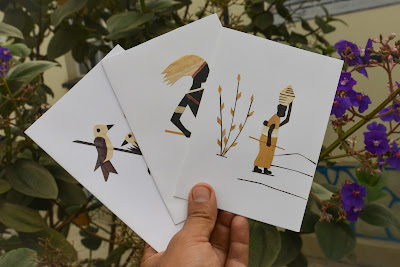 |
| Artsy Cards |
Reconciliation
In 1944 a Jewish man by
the name of Raphael Lemkin created the term genocide to describe what Nazi Germany had done to
the Jews before and during WWII. In the years since, large scale genocide has
not been so common in the world. So it was of great misfortune that one took
place in Rwanda. In the aftermath the country was in utter chaos. There were
far too many dead to bury at once. In the streets stray dogs ate the bodies
where they lie, and the animals had to later be put down because they'd
developed an appetite for human flesh. Other people were dumped in mass graves,
never to be identified, no one left to mourn them. As for the survivors, they
searched desperately for family who might still be alive. It was a long and
trying process of small community networks. But more often than not there
weren't any joyous reunions to be had. The children had it the worst. 90% of
those alive at the end of the genocide had either been exposed to, or subjected
to violence. Now adults, these people still carry the emotional scars of a time
they will never be able to forget.
After Kagame had
defeated the Hutu militants in Rwanda, he had a choice--revenge or
reconciliation. He went with the second. But it was a delicate situation. How
could he reconcile with the Hutus who had only a short time before murdered
most the Tutsis in the country? Kagame began by dealing harshly with those who
had orchestrated the genocide. But other men who had become swept up in the
violence and killed under orders were brought to stand trial before local committees.
If convicted, the perpetrator was given a choice. He could admit his to his
crime and then ask forgiveness from the victims. In the event he did his
sentence was reduced, and rather than serving time in prison, the man could
spend his sentence doing civil work to help rebuild the country. It was a start
in the right direction. But Kagame did not stop there. He also eliminated the
distinction between Hutus and Tutsis, declaring that the people of Rwanda were
now one people--Rwandans.
The Hutus that had fled
into Congo, however we're still a problem. They reorganized and were intent on
opposing the RPF government. Kagame, with US backing, hunted them down in the
deep Congo jungle. But the rebels were too numerous to contain. Sometimes they
crossed the Rwandan border and raided villages. In one incident in 1997 they
went into a school and demanded that everyone separate into Hutus and Tutsi.
The students, only 12 year old boys, refused, saying, "We are all
Rwandans!" The soldiers tossed a grenade as a result, killing many
indiscriminately. But those who died did not do so in vain. Their example of
courage and solidarity sent a message across the country, one that inspired
others to set aside their hatred and differences. The situation has only improved
since then. If only the same could be said for elsewhere, in Congo for example.
Unfortunately, for that country, the presence of Rwandan militants precipitated
the First and Second Congo Wars, involving at one time or another, soldiers
from Rwanda, Uganda, Burundi, Angola, Zimbabwe, Namibia, Chad and Sudan. The
two wars have since become the world's bloodiest conflicts since WWII. To this
day insecurity plagues the land and it was for that reason I did not visit.
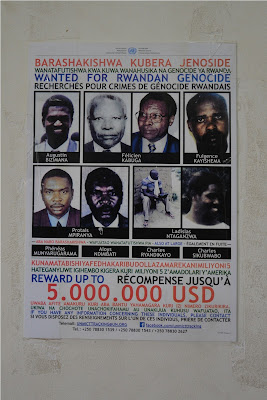 |
| Genocide Criminals |
Kigali
Topographically, Rwanda
is dominated by hills and is not the place to build big cities. Kigali is the
largest. To go from one part of the city to another required a lot of ups and
downs. The most convenient mode of transportation was on a motorcycle taxi.
Unlike elsewhere in Africa, the drivers were required to register with a
company and use a helmet. They also had a helmet for passengers and carried
only one at a time. This was an example of the type of order that Kagame had
instituted in his long tenure as president. Throwing trash in the streets came
with consequences too. And crime was rare because every 100m or so, armed
soldiers stood watch 24/7 and communicated with others in the area by radio.
Then plain clothed police roamed the streets mixed in with pedestrians, ever
watchful. For a city of its size, Kigali was likely the most secure metropolis
on the continent. It was also eerily quiet at night. The place didn't have a
curfew, but aside from in a few nightlife spots, there was hardly anyone on the
streets after 10 o'clock.
Gati had a friend from
France who was living in Kigali. The woman, Barbara, was studying to teach
French as a second language. She had only recently found a room at a shared
house a ways outside the city center. I was thinking it would be a simple set
up, but when we pulled up front by motorcycle taxi, the house was a big white
mansion. Well, not quite. It had only 5 rooms. Yet with its colonnaded walls
and large yard I couldn't be blamed for my first impression. Inside the house
lived a mix of Africans and Westerners. One guy, Vicky, dedicated himself to
painting. He was from Rwanda and had been a boy when then the genocide happened.
Most his family had died and he'd soon became a solider, using a rifle to kill,
and doing it at an age before most men require their first shave. But I'd have
guessed it by looking at him. He was a
gentle, friendly guy who shared everything without a second thought. It's
strange how life takes its twists and turns like that.
Barbara was a good
host. To repay her kindness I cooked dinner so that we could sit
down and have a nice meal together--me, Gati, Barbara, and her Rwandan boyfriend whose
name was Ngenzy. When I'd dropped by the local market earlier, I took in the
fine selection of vegetables, beans, rice and fruit. My eyes grew wide at the
sight of the avocados. They were big, green, and cheap. Two ripe ones was
all I needed to later fill a bowl with creamy guacamole. Another French friend
named Bruno invited us over another night for dinner. He had married a local
and she'd recently bore him a son. Bruno was in love with Africa. He'd had lived in
Burundi two years prior and even stayed a few months into that country's
political collapse in order to finish a project. And going back a year more,
he'd spent six months in a village in the Kalahari desert of Namibia. Oh the
stories he told me over beers, of how a black mamba had attacked his moving
jeep, or how he'd eaten elephant and giraffe meat with the tribesmen, the leftovers
of the game hunts carried out by wealth foreigners.
The last thing Gati and
I did in the city was climb Mt. Kigali. More of a large hill than a mountain,
it loomed over the southern extreme of the capital, and opposite, gave way to
villages and countryside. At the top was a horse ranch, a rarity in the region.
Gati liked horses, but to ride one cost too much for her. So we ventured a
little further and found a type of restaurant bar known for its BBQ rabbit. It
was a Sunday, and a young group of Rwandans were drinking beer at a table. They
invited us over and said they'd been partying since the night before. One of
the ladies at the tables sat toppled over her boyfriend. She awoke when the food
came. The four of them had ordered a plate of rabbit and shared it with us. I
made due with a leg. It was tough and stringy, but delicious nonetheless.
Before leaving I went to see the rabbits that were still alive. There were
perhaps 20 and a man was feeding them grass. Rabbit meat was uncommon in
Rwanda, and yet these rabbits were about to become it. Poor little animals I
thought. They'd never see the knife coming until it was too late. How
hypocritical of me though to pity them. I'd just eaten one.
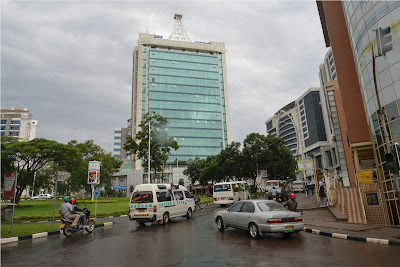 |
| Downtown Kigali |
 |
| City Suburbs |
 |
| Local Brew |
 |
| Barbara's Home |
 |
| Out for Fun |
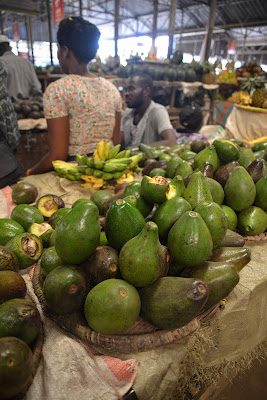 |
| Lovely Avocados |
 |
| Vicky |
 |
| From Mt. Kigali |
Lake Kivu
After Kigali we went to
the western extreme of the country where most the border ran along a deep water
lake called Kivu. A few towns lined the shore. We first visited Kibuye. Built
into green hills that fed into the water, Kibuye was an incredibly beautiful
place. The hostel we stayed at, St Jean's, stood atop a peninsula with excellent views. There we met two medical students who were doing an
internship at a medical center in the city of Huye. The guy was from Vermont
and the woman from Amsterdam. The next day we shared a boat on the lake. Our
guide took us to Napoleon Island famous for its colony of fruit bats. He led us
up a hill and rambled down below into the bush. When he was low enough he
clapped his hounds loudly and startled bats rose into the sky. Thousands and
thousands of them circling in the sky. They were the large variety with the
head of a dog, something like that of a Jack Russell Terrier. I took loads of
photos before they settled back into the tree tops.
Kibuye, for all its
majesty, didn't have much to do besides soak in the scenery. So we soon took a
bus north to another town called Gisenyi. It was a public bus that quickly became
packed with locals. The woman next to me had a little boy flopping his head
over her arm. The road wound through a dirt road in the hills and the movement
made the boy sick. He threw up on my foot and backpack. The mother apologized
and tried to wipe it off with a handkerchief. Onward the bus went, over the
bumpy road, up and down. The scenery was stunning, endless green hills with
small villages scattered throughout. But the ride was slow going, painfully
slow. It took seven hours to transverse the 110km to Gisenyi. I was so happy to
reach the city I could have kissed the dusty sidewalk once I'd gotten off. But
our priority was to find a lodge. We settled on an establishment called the
Africana. After that we had an early dinner. I was biting into a forkfull of
beans when I crunched down on something hard. It was a small rock and it
chipped one of my upper molars.
I needed to get the tooth fixed and worried the treatment would be subpar
considering Gisenyi wasn't so big a place. But I found a good dentist and he
went to work with his pointy instruments and loud drill. I'd had a cavity in
the same spot and he scraped it out before rebuilding the tooth. When the work
was done I walked out the office tense all over. I won’t deny how much I hate visits to the dentist. It’s up there alongside a swift kick to the balls as one of my least
favorite things. Anyhow, Gati and I meandered over a half kilometer to the
border crossing into Congo. On the other side was a town called Goma. It was
one of the more secure places in the country and we saw military planes flying
in endlessly, their flight path crossing over the lake. At the border I found a
currency exchange kiosk and traded for Congo francs to add to my money
collection. Interestingly, one of the bills showed a picture of men digging for
diamonds--blood diamonds to be sure. Odd that the government would want to
promote the industry on its currency.
Part of the lakeshore
in Gisenyi had manmade beaches. I'd heard the water contained some kind of
parasite and did not go for a swim. Trapped beneath the lake
was also a large amount of carbon dioxide that might at any moment erupt (but
never has) to the surface and suffocate all animals and people in the area.
Still, it was pleasant to sit near the shore and enjoy the breeze while little
waves lapped at the sand. I was lying back on the grass when a young local guy
came and struck up a conversation. He said his name was Antony and he wanted to
practice his English. So we talked politics and tourism. I learned that in Rwanda
it was difficult to start up a business because of high tax rates. But over in
Congo enterprise was a simpler matter, so in spite of the country's
instability, many foreigners still couldn't resist going in to make a quick
profit. Later Gati and I had dinner at a lakeside restaurant, and taxes and
all, the business seemed to be managing well. The joint offered beer and simple
food items. Gati and I ordered kebabs with French fries, an unhealthy yet quick
go to meal in East Africa. I sinfully washed it down with a bottle of Coca
Cola.
 |
| Lake View |
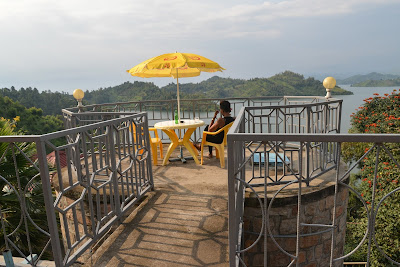 |
| At Hostel |
 |
| Boat Ride |
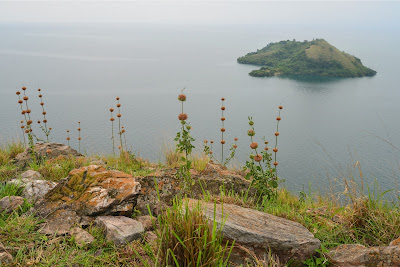 |
| Looking Down |
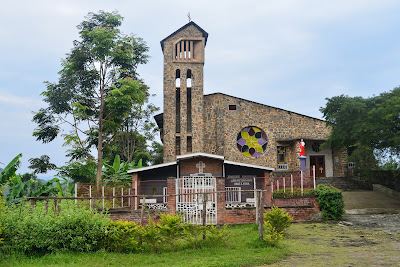 |
| Local Church |
 |
| Gisenyi Mosque |
 |
| Border Crossing |
Volcanic
The eastern part of
Africa is geologically split into tectonic plates that 35 million years
created the Great Rift Valley. It is divided into two branches, the western part having thrust up mountains that mark the borders between Rwanda, Uganda
and Congo. In Rwanda the mountains make up the Virunga Range, and at the base
we visited the city of Musanze. I'd lined up a Couchsurfing host beforehand for
the first time since arriving in Africa. The man's name was Hormisdas, and his
wife Modeste. They were very welcoming. As usual I wanted to cook them some
food. But because Modeste said she'd do dinner I prepared only guacamole and
served it with chapati bread as an appetizer. Hormisdas had invited other
friends as well, a volunteer worker from Germany and her visiting parents. The
father was a former journalist and he rambled on and on about the refugee
crisis in Europe. That lead to a deep political conversation that exposed my
ignorance regarding the German government. I hadn't even know the name of their current chancellor. Yet Hormisdas understood very well the politics. It never ceased to
amaze me, the knowledge possessed by the Africans I met. People from the
outside look at the continent as some kind of backwater, a huge expanse of
ignorant uncultured types. From what I'd seen it couldn't be further from the
truth.
At first Gati and I
were thinking of climbing a volcano. But the cost proved too high. The other attraction in the area was to see the highland gorillas. That was even more
money. $700 for a one day outing. So we settled on two side trips outside of
town. The first was to a tea plantation. We got off the local bus and walked
right into the fields. Locals were hard at work picking and sorting leaves. They looked at us with
mild curiosity, probably wondering why foreigners had come to their place of
labor. If they'd spoken English I'd have told them the reason. I wanted to take
pictures of the green expanse of plants. The plantation sat flat in a valley
that extended out of sight. Several children followed us as we went deeper and
deeper into the valley. The female workers had baskets on their head or back.
They also wore a colorful wrap called an entege, the traditional women's wear
of Rwanda. I wanted to take pictures of them too, but they weren't having it.
The whole time I'd traveled in Africa the locals did not like me pointing my
camera at them. The exception was if I knew the person well. Then they didn't
seem to mind.
Our last day in Musanze
we visited the nearby twin lakes. They were also in an area few foreigners went
to. We walked from the main road onto a dirt track that lead past village after
village. The locals here, like in Musanze, we're very friendly. Though they
didn't speak English everyone greeted us and smiled without fail. As for the
kids, they of course pointed and said "Muzungu." I tried counting how
many times I heard the word but lost track after 20. When we got to the lake it
was at the edge of a large village which we had to pass through on an adjacent
trail. This was a very rural area. People grew corn and other foodstuff on
scraggly earth dotted with volcanic rock, and the houses didn't look like much.
Children followed Gati and me. Some of them spoke to us, using random English
words. It wasn't much communication-wise, but they were trying and I was happy
to humor them with responses. Once they understood what we wanted to see, they
guided us to a small port on the lakeshore. The landscape lacked the impressive look of Lake Kivu, but it was
still a joy to gaze out over the water after such a long walk.
Gati and I both agreed
that Musanze was our favorite place in Rwanda. The people convinced us of it.
When we returned to the village center we wanted to return from there to the
main road by motorcycle taxi. Only one bike was available though. So the driver
called his friend to come, and we sat and waited. It ended up taking forever.
In the meantime a growing group of locals formed a tight circle around us. Most
of them were children but some older people stopped too. Being the center of
attention I felt I had to do something. I showed them my camera, then took out
a map I had of Rwanda. Gati noticed that a little girl was wearing a San Diego
Zoo t-shirt. I snapped a picture of her, and she felt so singled out, she
almost cried. Thankfully, one of the locals could speak English, and he
explained why I'd wanted the photo. The other driver finally arrived and we
hopped on the two bikes to return to Musanze. From there we headed back to
Kigali, but before leaving I printed a picture I'd taken earlier of Hormisdas
and Modeste. You know, it's those little things that show gratitude for a CS
host's hospitality.
 |
| Modeste |
 |
| Church and Graves |
 |
| Out to Pick Tea |
 |
| Glorious Tea |
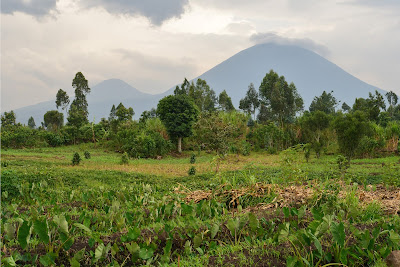 |
| Volcanoes |
 |
| Boys Pose |
 |
| For Sale |
 |
| Gati on Motorcycle Taxi |
 |
| Boat on Water |
Wrap Up
We only spent a little
over two weeks in Rwanda. Perhaps the country warranted more time, but in many
respects it was similar to Uganda, and we decided we should continue our
travels to another place. We were fortunate to have a friend like Barbara in
Kigali. She welcomed us into her home during our long journey, and staying
there, even if only for a few days, gave us the opportunity to recharge. I was
also lucky to be with Gati while on the road. And from her perspective, she was fulfilling a
dream of visiting Africa, something that would have been difficult on her own
as a woman.
 |
| Walking on Stilts |



































No comments:
Post a Comment